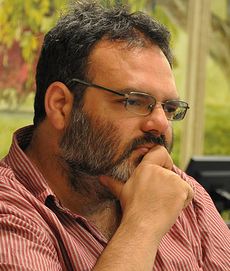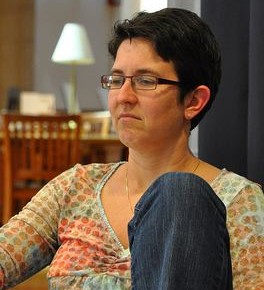2013 Participants
- Susan Trumbetta
- Sarah Pearlman
- Kathleen Hart
- Cynthia Kerr
- Colette Cann
- Light Carruyo
- Leonard Nevarez
- Bill Hoynes
- Curtis Dozier
- Allan Clifton
- Hiram Perez
- Yu Zhou
2012 Participants
- Candice Lowe Swift
- Quincy Mills
- Tom parker
- Mita Choudhury
- Eric Eberhardt
- Maria Hantzopoulos
- Erin McCloskey
- Rachel Friedman
- Bert Lott
- Tebbie Collins
- Julie Park
2011 Participants: Projects and Outcomes
Hiram Perez (English Department and Women’s Studies Program)
 Hiram came to Pedagogy in Action to gain insights and teaching techniques to deal with the emotional reactions many of his students had to his “Queer of Color Critique” course (ENGL/WMST 218). He sought to empower them with the theoretical tools to understand their responses to challenging ideological constructs. He also came away with ideas for amplifying his digital projects: a scholarly wikisite co-created with students, and a glossary of queer terminology and history.
Hiram came to Pedagogy in Action to gain insights and teaching techniques to deal with the emotional reactions many of his students had to his “Queer of Color Critique” course (ENGL/WMST 218). He sought to empower them with the theoretical tools to understand their responses to challenging ideological constructs. He also came away with ideas for amplifying his digital projects: a scholarly wikisite co-created with students, and a glossary of queer terminology and history.
Molly Shanley (Political Science Department)
 Seeking to refresh a course she had taught many times — POLI SCI/WMST “Sex and Justice” — Molly discovered inspiration in the stories of a colleague who had her students use interviews with alumnae as source material for the course. After Pedagogy in Action, Molly said, “I was really struck by the idea that students should be producers of knowledge and not just consumers of knowledge.” She worked closely with librarians and the network of Vassar alums to create an innovative research project for her students this semester.
Seeking to refresh a course she had taught many times — POLI SCI/WMST “Sex and Justice” — Molly discovered inspiration in the stories of a colleague who had her students use interviews with alumnae as source material for the course. After Pedagogy in Action, Molly said, “I was really struck by the idea that students should be producers of knowledge and not just consumers of knowledge.” She worked closely with librarians and the network of Vassar alums to create an innovative research project for her students this semester.
Colette Cann (Education Department)
Colette worked on revamping her Education 255 course, while simultaneously thinking about and redesigning a course she hadn’t taught before, Education 345. Both courses focus on race, representation, and resistance in K-12 and higher education; Colette sought to change the 255 course to reflect a greater focus on critical race theory and K-12, with the 300-level course designed as a follow-up. She sought to change some of her written assignments, and to update her use of technology. Colette is currently teaching Education 255, and has reported so far that she took to heart the idea of “backwards design” and started with activities and assignments in mind before selecting readings for each class; she let the activities of each class push the reading and the discussions/topics on a given day. This enabled her to align her learning goals with her assignments and assessments. Check back here later to find out how the semester ended!
Teresa Garrett (Chemistry Department)
 Teresa applied in order to transform a rather standardized course in the Chemistry department: Chem 125, an introductory-level course that assumes most of its students have done very well on the AP Chemistry exam, and who have proven proficiency in Chemistry. In one semester, this course covers the material that has traditional been handled in two semesters of General Chemistry (108 and 109). These talented students often enjoy greater challenges, and Teresa decided she wanted to move from a rather traditional “lecture-based” model to an experimental “inquiry-based” or “problem-based” form of learning, which emphasizes group work, student accountability, and greater work outside the classroom. Teresa reported that students enjoyed team learning, and that their grades, on average, were higher on problem sets than they had been when she taught Chem 125 in the past, and that although the tests she administered were more difficult, she did not have to grade on a curve. Students reported learning a lot, but Teresa admits they felt it was very challenging. She lectured less, which detracted from her stellar abilities as a lecturer; but students gained much from being able to learn from each other. The best part of trying this out? “It made me bold,” says Teresa. She will try teaching this way again in the future. She is currently the only person in the Chemistry Department teaching Chem 125 as a problem-based course.
Teresa applied in order to transform a rather standardized course in the Chemistry department: Chem 125, an introductory-level course that assumes most of its students have done very well on the AP Chemistry exam, and who have proven proficiency in Chemistry. In one semester, this course covers the material that has traditional been handled in two semesters of General Chemistry (108 and 109). These talented students often enjoy greater challenges, and Teresa decided she wanted to move from a rather traditional “lecture-based” model to an experimental “inquiry-based” or “problem-based” form of learning, which emphasizes group work, student accountability, and greater work outside the classroom. Teresa reported that students enjoyed team learning, and that their grades, on average, were higher on problem sets than they had been when she taught Chem 125 in the past, and that although the tests she administered were more difficult, she did not have to grade on a curve. Students reported learning a lot, but Teresa admits they felt it was very challenging. She lectured less, which detracted from her stellar abilities as a lecturer; but students gained much from being able to learn from each other. The best part of trying this out? “It made me bold,” says Teresa. She will try teaching this way again in the future. She is currently the only person in the Chemistry Department teaching Chem 125 as a problem-based course.
Brian Godfrey (Earth Science Department and Urban Studies Program)

A veteran professor, Brian sought to reinvigorate his teaching by making changes to a course he had taught often in the past: GEOG/URBS 250, Urban Geography: Space, Place, and Environment. The course has been a cornerstone of the multidisciplinary program and department in which Brian teaches, and he sought to bring fresh skills and innovative practices to it. The major transformation for him? Articulating clear course goals on his syllabus and tying these to richly imagined assignments. He also changed the kinds of readings he assigned, moving from longer texts to professional articles in the field. He reports that linking learning goals to content enabled him to become a “more engaged teacher,” and that his “CEQ’s were excellent!” Always a nice bonus, right?
 Matthew Miller (Mathematics Department)Matt had taught Advanced Linear Algebra (Math 364) the previous year, and was interested in exploring different pedagogic methods for upper-level students who felt more comfortable with mathematics and could stretch their creative learning muscles. He wanted to see more involvement from the students, and have them help produce knowledge in the classroom. He worked on integrating student lectures, group problem solving, and new technologies into the class. He also wanted them to become aware of learning how to learn. “I had more tools to understand this goal after Pedagogy in Action, and I made it a lot clearer in my syllabus,” Matt reports. “Happily, my expectations were met!”
Matthew Miller (Mathematics Department)Matt had taught Advanced Linear Algebra (Math 364) the previous year, and was interested in exploring different pedagogic methods for upper-level students who felt more comfortable with mathematics and could stretch their creative learning muscles. He wanted to see more involvement from the students, and have them help produce knowledge in the classroom. He worked on integrating student lectures, group problem solving, and new technologies into the class. He also wanted them to become aware of learning how to learn. “I had more tools to understand this goal after Pedagogy in Action, and I made it a lot clearer in my syllabus,” Matt reports. “Happily, my expectations were met!”
Eva Woods (Hispanic Studies Department)
Eva’s challenge was to create a new course in Hispanic Studies, a senior seminar entitled “New Cinema and Media in Spain.” She wanted the course to be innovative and cutting edge, incorporating film and new media with theoretical frameworks. The result of her work during the summer institute was a wonderfully varied course where students were the producers of media, creating Wikipedia pages and blog content, as well as discussing and writing about events like Occupy Spain as they were unfolding. “I really emphasized active learning,” said Eva. “Pedagogy in Action made me feel I could take risks in my teaching.”
